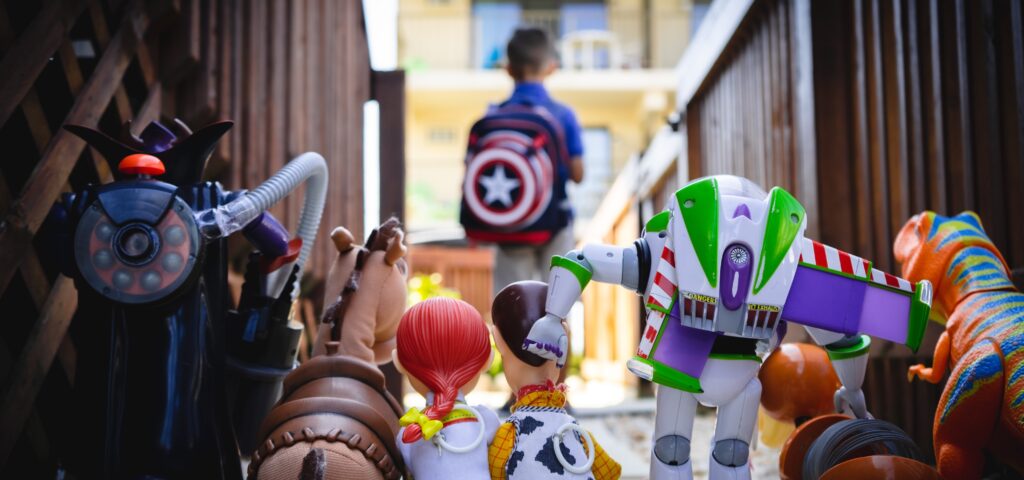By Joseph Staples // SWNS
NEWS COPY W/ VIDEO + INFOGRAPHIC
Do you ever find yourself reminiscing over favorite childhood toys or memories? A new survey has revealed four in five Americans look up their childhood favorites for the nostalgia.
The poll of 2,000 American Gen Zers and millennials found that, if given the opportunity, 67% would try to buy a replica of something from their childhood and 76% feel a sense of nostalgia in the process.
This comes as two in three (65%) adults realize they can now buy things for themselves that their parents would never let them have or couldn’t buy for them as a kid.
Of those who have made this realization, 54% either “often” or “always” buy the things they could never have as children, including video games (51%), clothes (51%) and snack foods (50%). Four in 10 (41%) will even splurge on expensive toys.
Commissioned by MGA’s Miniverse and conducted by OnePoll, the study found 59% of people consider themselves “kidults” — adults who hold onto their childhood spirit via consumer products like video games, toys, books, movies, fashion and so on.
These self-identified “kidults” believe they’ve earned the title by embracing feelings of nostalgia: frequently rewatching movies and shows from their childhood (59%), watching cartoons (54%) or by remembering specific products from their childhood (49%).
This power of nostalgia goes so far, 38% even have toys and collectibles on display in their home or at work and 68% have made or strengthened a relationship because of the toys or collectibles they display.
Eighty-four percent of these toy collectors have held onto toys from their childhood, for an average of 16 years. Among them, the most popular types of toys to hold onto included collectibles (63%), stuffed animals (61%), dolls (40%) and doll accessories (40%).
But there is an interest in new innovations, too. As adults today, 85% said they’ve purchased either childhood toys or exact replicas of their childhood toys.
When asked what motivates them to embrace being a “kidult”, respondents said they felt a sense of nostalgia (63%), entertainment (62%) and youthfulness (50%).
“Embracing nostalgia is a big part of being a ‘kidult,’” said Isaac Larian at MGA Entertainment. “That feeling gives us the ability to hold onto the imagination and creativity we often associate with childhood. In many ways, holding onto toys and collectibles from our past is both liberating and entertaining, and miniature versions of them makes this experience more accessible.”
Results also found that when Americans have some extra money available to them, 54% will splurge on toys and collectibles. They’re also more likely to spend on clothing (56%), hobby interests (43%) or video games (42%).
In any given month, the average toy collector is willing to spend $158 on toys and collectibles.
One-fourth (28%) also named miniaturized foods/household items as the top type of toy they purchase today for themselves.
In fact, forty-six percent said they have a preference for small or miniature items in general, compared to full size. When asked why they prefer miniature things versus larger items, 56% mentioned miniatures being cuter, 48% said they are easier to take with them, and 46% said they are entertaining.
Seventy percent also said they would gift an adult friend with a toy or collectible.
“Holding on to old toys or buying new ones that remind you of the ones you had as a kid is something to be celebrated,” continued Isaac Larian. “We encourage people to have mini toys on display as a constant reminder of being a kid at heart. It’s a perfect way to create unique connections with friends and show off our personal interests and personalities.”
TOP 10 SIGNS YOU’RE A “KIDULT”
- Frequently rewatch childhood movies and shows - 59%
- Watching cartoons - 54%
- Remembering specific childhood products - 49%
- Quoting childhood movies and shows - 48%
- Browsing the internet for childhood products - 45%
- Wearing clothes with nostalgic styles or references - 43%
- Owning a large collection of beloved video games - 40%
- Displaying beloved toys and collectibles at home or at work - 38%
- Rather having a game night in with friends than go out to a bar - 37%
- Buying kids the same toys from your own childhood and playing together - 35%
Survey methodology:
This random double-opt-in survey of 2,000 Gen Z and millennial Americans was commissioned by MGA’s Miniverse between May 31 and June 2, 2023. It was conducted by market research company OnePoll, whose team members are members of the Market Research Society and have corporate membership to the American Association for Public Opinion Research (AAPOR) and the European Society for Opinion and Marketing Research (ESOMAR).
